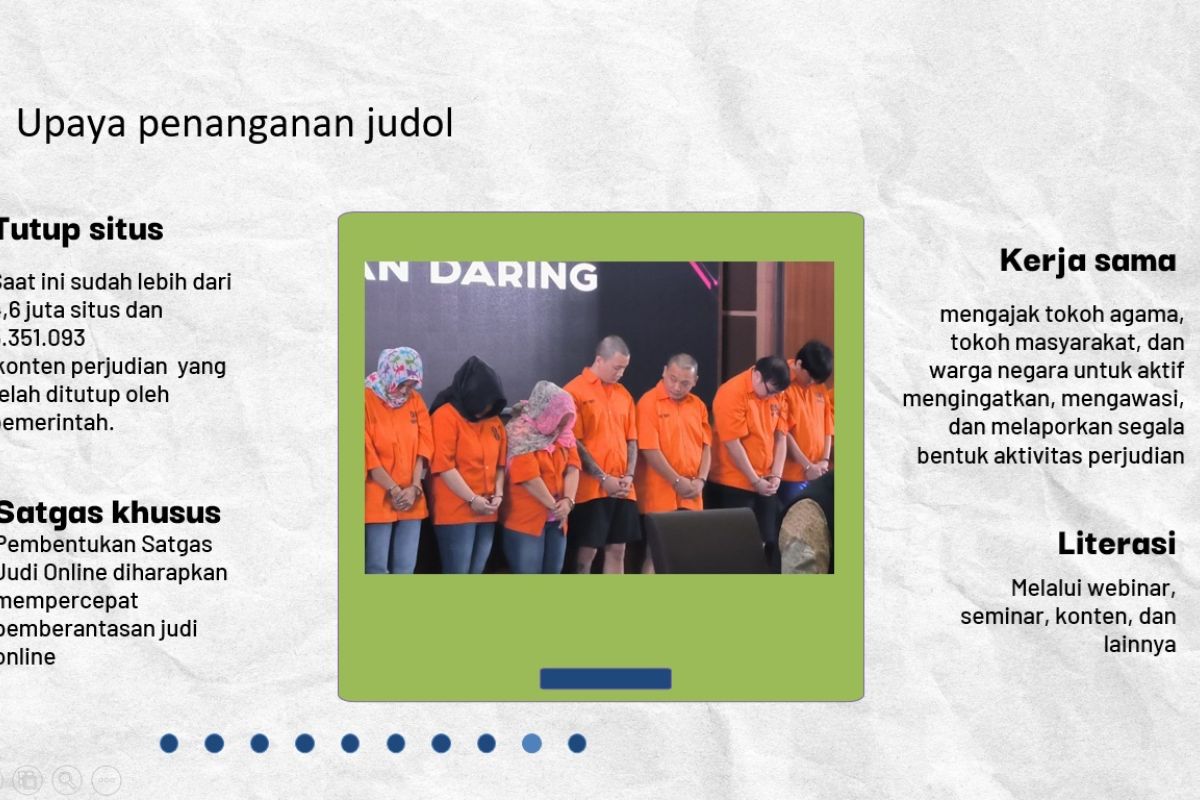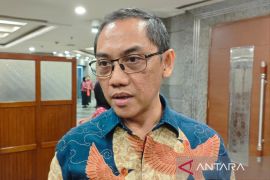The Ministry of Communication and Digital Affairs and the National Police have responded with unceasing cyber patrols and strict action, such as deleting accounts suspected of being linked to online gambling.
According to the ministry's data, the total number of online gambling accounts taken down in the period from 2017 to December 4, 2024, stood at more than 5.3 million.
The highest number of accounts were taken down this year at 3.6 million, an increase of three-fold compared to 999 thousand in 2023.
The largest group of online gambling players belongs to the 30–50 age bracket at 1.84 million, followed by the above-50 group (1.35 million) and the 21–30 age group (520 thousand).
However, what has set alarm bells ringing has been the involvement of children aged under 10 in online gambling, with their number reaching 30 thousand.
Director of Media Management at the Ministry of Communication and Digital Affairs Nursodik Gunarjo informed that gambling bookmakers often use two modes to catch players: extorting bank accounts and online top-ups.
Bookmakers often catch prospective victims through their family members or friends, trapping them with algorithms, or even, promoting gambling directly to targets.
According to Gunarjo, there are five phases that online gambling victims go through: registering, starting to play, the playing phase, the addiction phase, and finally, gaining the awareness to get rid of the addiction.
Most people fall victim to online gambling due to economic issues and hope to make quick money through it.
Gunarjo also reminded parents to look out for behavioral changes in children, for instance, isolating themselves.
Uphill task
The public was recently shocked by the arrest of officials from the Ministry of Communication and Digital Affairs over online gambling involvement since the officials have been assigned the task of taking action against accounts suspected to be linked to online gambling.
Instead, those officials helped keep the accounts active for a reward.
This underlines the fact that commitment to eradicating online gambling must start from law enforcement officials.
Head of the multimedia bureau of the National Police's (Polri) public relations division, Brigadier General Gatot Repli Handoko, stressed that Polri will detain and sanction bank officers and civil servants found to be involved in online gambling, including Polri personnel.
Law enforcement measures will be followed by a series of asset confiscations, both at home and abroad, as well as blocking of websites related to online gambling.
Polri is also bolstering the online gambling eradication task force, which involves 22 ministries and agencies.
According to Handoko, President Prabowo Subianto has firmly instructed the police to root out online gambling, in keeping with Asta Cita goal number 7.
With online gambling exposure becoming widespread, it has indeed become challenging for Indonesia to eradicate the practice. Especially since online gambling advertisements can easily pop up on social media platforms or sites.
Handoko noted that even though many perpetrators have been prosecuted, online gambling is still rampant in society because people's lifestyles cannot be separated from their gadgets.
Data shows that the number of Internet users in Indonesia has touched 212.9 million. They account for around 77 percent of the national population. Unfortunately, the growth in the number of Internet users has not been accompanied by strong literacy.
He informed that several policies have been applied by police to end online gambling, starting from prevention efforts, such as creating educational content on the negative impacts of the practice, blocking online gambling content, and collaborating with social media influencers.
Meanwhile, law enforcement is being carried out by taking action against perpetrators, including affiliates funded by perpetrators, and blocking sites.
According to Head of the Communication Studies Masters Program Department at Muhammadiyah University, Jakarta, Tria Patrianti, the policies for online gambling eradication would be effective if efforts to educate the community are made more persuasive and accompanied by law enforcement.
Data from the Financial Transactions Reporting and Analysis Center (PPATK) in 2023 showed that 3.2 million Indonesians were gambling online by putting in a deposit of less than Rp100 thousand (around USD6.24).
The majority of Indonesians understand that all gambling practices are prohibited by religion. However, most of those exposed to the practice are affected, depending on their level of education and the desire to earn a quick buck.
Many gambling addicts start by becoming curious after seeing advertisements on social media and eventually get trapped by the online gambling system, which is designed to fuel addiction.
An immediate approach to addressing the psychological and social aspects by involving families and close ones has proven to be the most effective in making people aware of their online gambling addiction.
In some cases of late handling, the gamblers became desperate and then committed crimes such as stealing, robbery, and so on.
From the government's side, it is important to think about separating the regulatory function from enforcement so that online gambling can be eradicated from its roots effectively.
Regulators have been tasked with preparing legal instruments and carrying out supervision, while law enforcement has been handed over to the police, prosecutors' offices, district courts, and the Supreme Court, who are responsible for cyber patrols, taking action against content related to gambling, and hunting down perpetrators abroad.
Related news: Digital ministry dismisses five contract staffs over maladministration
Related news: Eradicating online gambling to prevent new poverty
Editor: Rahmad Nasution
Copyright © ANTARA 2024












